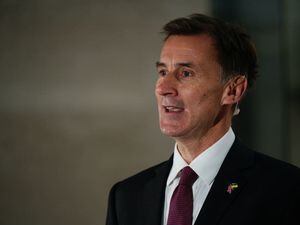The ghosts of politics past
The UK is back in the world of Butskellism and Andy Sloan fears there’s a big bust around the corner...

‘AND the OBR says today that the lower interest rates generated by the government’s actions are already benefitting our economy and sound public finances.’
You’ve got to hand it to Jeremy Hunt, he’s certainly got chutzpah. Such are today’s political behavioural norms there wasn’t even the hint of a smirk on his face as he delivered this whopper to the House of Commons two weeks ago. OK, if not an actual whopper, it certainly stretches the bounds of credulity when you register that what he was referring to was the fall in 10-year gilts to 3.8% from their 4.2% level just 10 days previously, before he started leaking details of his own statement.
‘Well done you,’ I swear I saw Kier Starmer mouth across the benches.
I jest obviously, but he would have been justified if he had done as it was as good as any Labour budget Rachel Reeves could have delivered. Because despite everything that’s going down, there isn’t any real economic policy debate being had. The UK is back in the world of Butskellism of the 50s and 60s. Remember where that got us.
I was recently invited to speak at the Insurance Institute of Guernsey Annual Conference and cover the economic implications of the war in Ukraine, energy and food prices. The works basically. I relished the opportunity to chunter about the state of the world economy to a captive (no pun intended) audience.
My narrative was that we’re in the middle of a period of major macroeconomic change. A whole host of economic chickens have come home to roost all at the same time. Monetary, trade, fiscal, a whole host of unsustainable imbalances. All having to be wound back. Pandemic and war may have lit the touchpaper this year, but underlying fundamentals were all well out of kilter after more than a decade’s policy inaction. And having done nothing for a decade, the Bank of England’s shock therapy wasn’t what the doctor ordered.
Regular readers will know I consider central bankers to be the main villains. But they couldn’t have gotten away with their inaction without the public and politicians’ tacit approval. We had a hairy moment in 2008 but rather perversely discovered, almost as an accidental by-product, that a hefty dose of QE helps dodge most of the pain of an economic downturn. So much so we developed quite a taste for it (why not, it was better than recession surely?) and subsequently applied it liberally each time things got a little tricky on the economic front. Euro Crisis. QE. Brexit. QE. Covid. QE. But it was deferral. It was at a cost. And the costs build up.
I don’t think the penny’s quite dropped as to how bad things might get. The scale of global debt built up since the global financial crisis is gargantuan. And there’s no sign of a new economic policy prescription.
‘The spending plans that we set … together with monetary stability, ends once and for all the boom and bust that for 30 years has undermined stability, hindered long-term investment in our public services and prevented this country from achieving its potential.’
Gordon Brown. That much was obvious. But the year ... 1998, introducing the new monetary policy framework and Bank of England independence.
It seemed a wee bit triumphalist back then, a quarter of a century ago. But in 2022 it clearly doesn’t reconcile with the facts on the ground. Consumer spending has fallen continually this year. Insolvencies are building. Not to be a cheerleader for misery but I fear there’s a big bust around the corner.
It was all supposed to be so different. When Gordon introduced his new monetary policy regime, the Governor of the Bank of England had to write an open letter to the Chancellor if inflation strayed more than 1% from its target, explaining why and what was to be done. If inflation was still 1% from target three months later, another letter had to be sent. It seemed very severe in those more naive days, akin to being sent to the headmaster’s study. Just to take stock. Base rates are more than 10 times what they were a year ago and inflation is presently more than five times its target. What did that last letter say? Anyone remember the details?
Today’s economic situation is no joke, even if the political approach by the UK Government looks like one. It’s gone from proposing the biggest tax reductions since the 1970s to establishing the highest tax base since the Second World War in a matter of eight weeks.
‘The wealth must be created before it can be distributed. This is where I believe a misunderstanding or something worse has arisen between government and the party on the question of public expenditure. You know we’ve not been creating wealth as fast as we’ve been distributing it.’
No, I didn’t lift this one from Mark Helyar’s resignation speech to the Guernsey Party. It’s from Jim Callaghan’s speech to the Labour Party conference in 1976. I thought it valuable to help make the point to explain that believing in this principle isn’t just some alt-right agenda.
I thought it particularly apposite as this is uncannily like comments made by the UK’s second-shortest serving Chancellor, Kwasi Kwarteng, when presenting his ill-fated mini budget two months back. I’ve eulogised about his comments about distribution and growth several times online and in these pages. Points which have received lots of support.
Sad to say, it seems politically and economically Guernsey has caught a bad dose of the British disease: the political preoccupation with spending and redistribution. Spending on income support has more than doubled since supplementary benefit was ‘modernised’ in 2014… just saying.
Even the usually reliable GPEG had me falling off my chair with their ‘go large’ call for a £200m. increase in taxes last week. Discussions about spending take place in a metaverse that lack the context of a global economy. Competitiveness and growth are largely absent from this political narrative.
It looks like the failure of the short-lived Kwasi experiment has scuppered the chances of supply side reform for a decade. Get set for another low growth decade. Living standards will fall.
In the years following the global financial crisis, the island witnessed a political and populist backlash against global finance generally and offshore in particular. Expect the same again soon. Populist scapegoats will be sought. When I was at Guernsey Finance, leading a post-Covid review of strategy, there was a unanimous acceptance of my premise that we wouldn’t have long before they’d be coming for us again. There was also an agreement that we needed to generate the raw material to defend ourselves.
It’s in that context that the International Sustainability Institute’s paper, ‘Convenient Untruths, exploring global fiscal fallacies’, was written. Its theme – demonstrating the lack of causality between offshore finance and global inequality. I made this point last month and also that UK wealth inequality had changed little in the last 25 years. Within days I was barracked in these pages by a senior lecturer from the Manchester School by the Jihadian cry that ‘the era of tax havens is coming to an end’. QED, I thought.
I’m ending with a shameless plug. The paper’s being published at a lunchtime talk at the Chamber offices on Thursday 8 December. I’ll be talking through the paper and the plans for the International Sustainability Institute in 2023. There’s no clash with the footie. Sandwiches provided. Tickets are a tenner. You can get them via Eventbrite. Be quick. Spaces are limited, as they say. See you there.
Tickets to the talk are available here.

